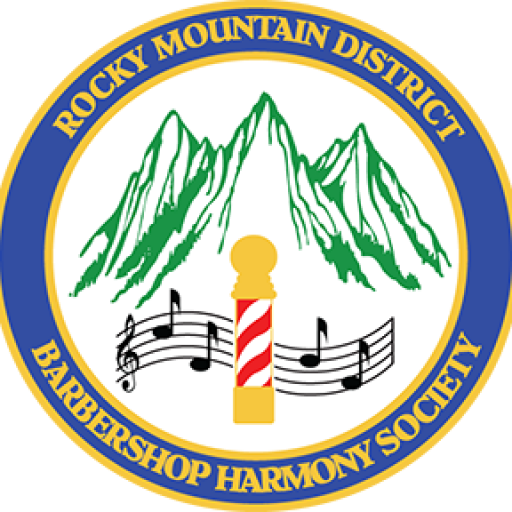Course offerings for Rocky Mountain Harmony College 2021 include the following:
- 5 Steps to Musicality (Keller) – When we join barbershop, we have directors and coaches teaching us how to sing better. We have directors and coaches teaching us techniques on how to move, how to connect and express our emotions, perhaps even acting techniques or dancing techniques. But what exactly does it mean to be musical (or not musical)? Who teaches us that? We will discuss 5 basic building blocks to consider in developing a musical approach to your songs and your performance, especially connected with the barbershop style.
- The Arranging Process (Tramack) – The success of an arrangement often is determined long before a single chord is written. From tapping into the backstory of the song, to finding sparks of inspiration, to fleshing out the blueprint, to determining how to create the perfect synergy between chart and performer, time spent up front developing a vision and planning the arrangement can save hours of time and frustration later. Whether you’re an experienced arranger, just getting started, or are looking to dip your toes into the arranging waters, this session will provide tools, ideas and approaches based on lessons learned “the hard way”. Theory of barbershop harmony knowledge is strongly recommended.
- Become the Most Improved Quartet (Dougherty) – You may never win a gold medal, but you can become the most improved quartet! In this session, participants will learn a tried-and-true rehearsal regime to maximize improvement over short periods of time. While this session will be geared primarily toward quartetting, there are sure to be gems applicable to choruses as well.
- Chapter Philanthropy/Local Arts Collaboration (Clark) – How do we connect with our community beyond staging performances?
- Chorus & Musical Leadership (Colosimo)
- Difference Between Presentation & Performance (Lietke) – Are you one of the many that still believes there is a Stage Presence Category? Get caught up (and then some) with explanation of the Performance Category, which will be paired with some very real stage tips to improve the performance of you, your quartet, and your chorus.
- How Is That Barbershop? (Keller) – Most of us have gone to an International contest, witnessed a performance, and thought “How is THAT barbershop?”. We wait for the scoresheets. Not only did the group not get disqualified, the scores from the MUS category (or ARR category) show nothing happened. The judging community is saying “That IS barbershop”. What????!!!! We will examine some of the more controversial performances as it relates to style and the questions raised. We will examine the earliest definition of the style and compare it to today.
- Improving the Health of your Chapter (Cox) – Learn about the various ways in which the BHS Leadership Operations Project Team can help your individual chapter discover what is most important to your members and take actions that will lead to success.
- Life Cycle of a Song (Clark) – How do we chose/practice/perform a song? And why? And how can we get better? And when do we part ways with that song? And… Help!
- Look Inside the Music (Tramack) – A piece of sheet music is really a treasure map: one filled with clues to creating a living, breathing work of art. Presented with the gift of lyrics which convey emotional subtext; a melody that conveys a range of emotions through its sweeping grandeur, it’s pacing and shape, the impact of intervals; harmony that creates a fabric, creates drama through tension and resolution, and provides the landscape for the journey. Rhythm provides the heartbeat; embellishments propel the music, serve as bridges which tie the song together, and help to highlight the most important thoughts. When all of these elements work together, in the hands of a sensitive performer, magic ensues. This course looks deeper into an arrangement with which almost every barbershopper is familiar, and looks at how we can find more music inside this music.
- Overtone Exploration (Dougherty) – Can you hear overtones? What if I could prove to you that you can? Come find out how to hear them and what they look like on the spectrograph.
- Performance for ALL (Devine) – Learn to take your song ‘from sheet music to stage’ – connecting your own perspective and life experience to your music, your fellow singers, and your audience! We’ll share on best practices for both preparation and performance, watching several examples together!
- Setting & Achieving Goals (Cox) – Why do goals fail? Learn the principles of goal setting. Learn the SMART goal-setting process that supports your strategy and objectives. Understand the benefits, obstacles, and actions; measure your success using the right metric. This process works for individuals, quartets, teams, committees and chapters.
- So You Want To Be Funny, Eh? (Clark) – We want to add comedy to our performances! Now what…?
- Vocal Production for Hobby Performers (Colosimo)
